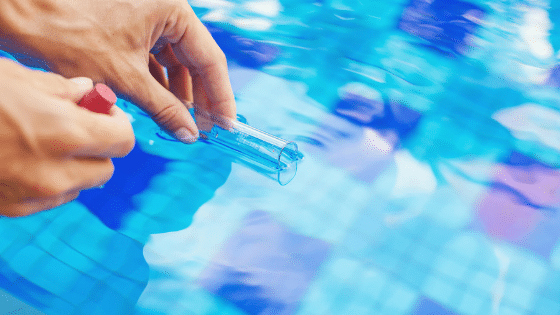There’s nothing more alluring than the sparkling blue water of your pool or hot tub. To keep that beautiful water safe and clean, you need a little science on your side. Thankfully, pool and spa water chemistry are easier than ever to test and balance. Treating your water proactively is much easier and less expensive than waiting for problems to occur. Don’t skip this important part of pool and spa maintenance. All you have to do is bring in a sample and we’ll help with the rest!
All Water Is Not Created Equal
Did you know that every single home has a unique water composition? Even if you live in the same town, water quality varies in every neighborhood. It can even be different if you live on the same street!
Why? For starters, cities have different water sources. Cedar Rapids draws from wells underneath the Cedar River, Iowa City gets its water from both bedrock wells and the Iowa River, and Hiawatha only sources well water. That’s why water can taste different from one town to the next.
Take a look at the water differences from these three homes in Linn County:
- Cedar Rapids – High alkalinity at 180 ppm (parts per million) but no other issues.
- Hiawatha – High alkalinity at 194 ppm, low cyanuric acid, and high phosphates.
- Center Point – High alkalinity at 170 ppm, low cyanuric acid, and low calcium hardness.
Piping can also add minerals and chemicals into your water. City pipes are made from steel, iron, or cement. They connect to your house through a water service line, which is made from copper or clay. Even your internal plumbing, garden hose, and prefilters can change your water composition.
Your swimming pool or hot tub water can contain biological contaminants too. Debris can be blown in by the wind or rain. Kids or pets with muddy feet can track in dirt. And our skin has an amazing microbiome that also harbors bacteria and viruses.
The Problems With Ignoring Water Chemistry
Water chemistry is an essential part of owning a pool or hot tub. Bacteria just loves to thrive in warm, moist environments. Sanitization prevents recreational water illness, skin irritation, and eye problems.

Water chemistry is also important for equipment maintenance. A low pH balance can cause etching, metal corrosion, surface stains, and vinyl liner wrinkles. And a pH that is too high will cause filter and heater element clogs, cloudy water, metal staining, and chlorine inefficiency.
For example, cyanuric acid is a common stabilizer for chlorine. It’s like sunscreen for your water because it prevents UV rays from dissipating the chlorine. But cyanuric levels that are too high can interfere with alkalinity, causing the pH to bounce erratically between acidic and basic.
Testing Is Fast And Easy
The good news is that water testing is a breeze. Splash Pool & Spa offers a free chemical analysis that you can use every week to test your water. We measure chlorine, alkalinity, calcium hardness, cyanuric, copper, iron, manganese, TDS (total dissolved solids), phosphates, and salt.
Take a clean bottle that holds 8 ounces of water and lower it into the water about 18 inches (or as deep as your elbow). Bring in your sample and our software will calculate your exact water chemistry. We will then help you select the correct chemicals to balance your water.
Testing your water is quick and effective. It’s a simple way to ensure your pool or hot tub is a relaxing and safe part of your home.
